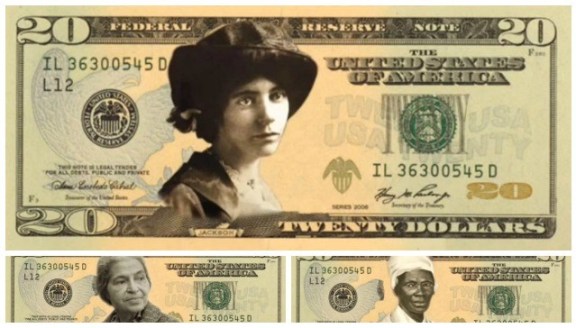 Only very recently, I came across the website Women On 20s, which “aims to compel historic change by convincing President Obama that NOW is the time to put a woman’s face on our paper currency… With at least 100,000 votes, we can get the President’s ear. That’s how many names it takes to petition the White House for executive action.”
Only very recently, I came across the website Women On 20s, which “aims to compel historic change by convincing President Obama that NOW is the time to put a woman’s face on our paper currency… With at least 100,000 votes, we can get the President’s ear. That’s how many names it takes to petition the White House for executive action.”
I got here late, so participants have already winnowed down the list from 30 to 15 candidates.
The process is quite self-explanatory:
1. Primary Voting. You may vote for three of 15 candidates…
2.Final Round Voting. When the Primary winners are announced, return to the voting booth to cast your ballot for one of the top three finalists.
3.Decision Day. On Decision Day, we will announce the people’s choice for the woman we’ll propose to President Obama for the new face of the $20.
“The year 2020 marks the 100th anniversary of the passage of the 19th Amendment that granted women the right to vote. So it seems fitting to commemorate that milestone by voting to elevate women to a place that is today reserved exclusively for the men who shaped American history. That place is on our paper money. And that new portrait can become a symbol of greater changes to come.”
Why boot Andrew Jackson from the $20?
As this Slate article from 2014 put it:
Andrew Jackson engineered a genocide through the “Indian Removal Act and the Trail of Tears, [his] campaigns to force at least 46,000 Cherokees, Choctaws, Muscogee-Creeks, Chickasaws, and Seminoles off their ancestral lands.”
Moreover:
“He was a fierce opponent of paper money and the central banking system, and would probably be horrified to see his face on our national currency. Leaving him on the bill as a form of mockery could be the best insult. But complicated historical slights don’t translate: His face on our money implies an honor that Jackson’s legacy doesn’t deserve. Worse, it obscures the horrors of his presidency.”
Here are the candidates:
ALICE PAUL (1885 – 1977) – women’s suffrage movement leader
BETTY FRIEDAN (1921 – 2006) – author of the Feminine Mystique
SHIRLEY CHISHOLM (1924 – 2005) – first black woman elected to Congress
SOJOURNER TRUTH (C.1797 – 1883) – famous for her journeys on the underground railroad
RACHEL CARSON (1907 – 1964) – writer of the important environmental book Silent Spring
ROSA PARKS (1913 – 2005) – civil rights activist
BARBARA JORDAN (1936 – 1996) – first black woman in the South to be elected to the US House of Representatives
MARGARET SANGER (1879 – 1966) – opened the first birth control clinic in the US
PATSY MINK (1927 – 2002) – first woman of color elected to the House, and the first Asian American elected to Congress
CLARA BARTON (1821 – 1912) – the founder of the American Red Cross
HARRIET TUBMAN (C.1822 – 1913) – women’s rights activist and abolitionist
FRANCES PERKINS (1880 – 1965) – Secretary of Labor under FDR, first woman appointed to the US Cabinet
SUSAN B. ANTHONY (1820 – 1906) – women’s suffrage movement leader
ELEANOR ROOSEVELT (1884 – 1962) – human rights activist and former first Lady
ELIZABETH CADY STANTON (1815 – 1902) – women’s rights activist and abolitionist
The organizers claim they have mechanisms in place to prevent “stuffing the ballot.”
The Washington Post noted that “the group has been ‘sort of surprised at the lack of opposition’ to the campaign, and… hopes it will ‘get this conversation going.'”
Women on $20s executive director Susan Ades Stone added, “We wanna be the hashtag that says #sorryAndrew.”
